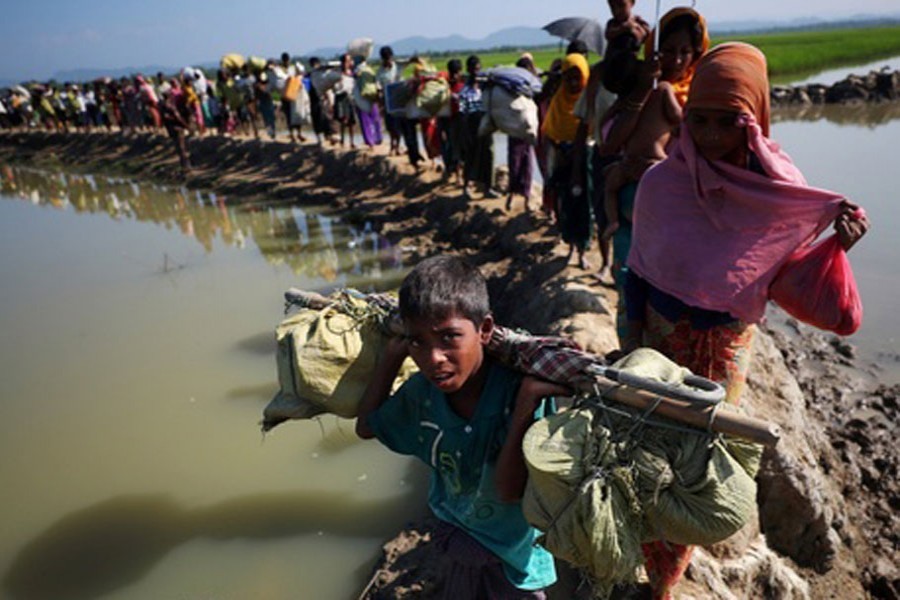Dilly-dallying with repatriation of Rohingya refugees

Mohammad Amjad Hossain from Virginia, USA
Published :
Updated :

The ethnic cleansing operation carried out by the Myanmar security forces against the Rohinyas since August, last year caused the fastest growing humanitarian crisis that the United Nations has ever faced. Nearly 0.7 million Rohingyas have fled their homes in Rakhine state to take shelter in Bangladesh.
A ray of hope for the solution of the refugee crisis emerged when Myanmar and Bangladesh signed a bilateral agreement on November 23 last year for starting the repatriation process within two months.
The signing of the deal on the basis of 1992 pact has raised many questions as it did not address the issue of citizenship status of the refugees. It just stipulated that Rohingyas will be taken back on the basis of residency. This pact has stated that Myanmar would not take back anyone without proper document and secondly, those who are not willing to go back could not be forced to return to Myanmar.
Since 1993, all documents and identity cards of Rohingya were seized by the government in Myanmar. Their houses were destroyed by the military Junta and there does not exist any sign now to prove their residency.
On November 25, 2017 the first-ever conference of Bangladesh Ambassadors and High Commissioners and Permanent Representative in UN was held in Dhaka where retired Ambassadors were also present. While inaugurating the conference Prime Minister Sheikh Hasina has said, the government wants to resolve the crisis by keeping good relation with neighbouring countries. Foreign Minister Abul Hassan Mahmood Ali in his speech emphasised to seek support from international community to send Rohingyas back to Myanmar.
By now most of the countries have spoken against inhuman treatment meted out against Rohingyas in Myanmar while the United Nations and the Amnesty International have described the atrocities perpetrated against Rohingya as "ethnic cleansing".
Meanwhile, many leaders from around the world, including Indonesian President and President of Switzerland visited Bangladesh to praise the government for offering shelter to Rohingya refugees.
Another heart-rending incident was revealed recently by an AP report which confirmed the existence of at least five mass graveyards in a village in Rakhaine State.
Now it become clear why Myanmar's Ministry of Foreign Affairs, headed by Nobel laureate for Peace Aung San Suu Kyi, denied visa to fact-finding mission established on March 24, last year by the UN Human Rights council to investigate human rights abuses in Myanmar.
Significant development recently took place in Myanmar when Bill Richardson, a member of the Advisory Commission on Rakhine state headed by former Secretary General of the United Nations Kofi Annan had resigned on 25 January this year from the committee by saying "the commission was formed as an eye wash to deceive international community."
Bill Richardson also blamed Aung San Suu Kyi "for furious response" to help releasing two Reuters Journalists while reporting on the Rakhine State. Bill Richardson was of the opinion that "Commission was likely to become cheerleading squared for government policy as opposed to proposing genuine policy changes that are desperately needed to assure peace, stability and development in Rakhine state."
Richardson was former UN Ambassador of the United States and former Secretary of Energy under President Bill Clinton who travelled to Dhaka, Kabul and Pyongyang as an emissary to release imprisoned Americans in other countries. At his request an American girl Eliadah Mc Cord was released from Dhaka jail after serving four and a half years. Eliadah was convicted for smuggling of heroin.
In December last year, the US government imposed economic sanctions against 52 individuals, including Myanmar Army General Maung Maung Soe for abusing human rights.
China and India - both neighbours of Bangladesh - and Russia are not forthcoming to put public pressure on Myanmar government to resolve the Rohingya crisis. These countries have stakes in Myanmar. Japan has also pledged to strengthen ties with Myanmar. India is eager to develop relations with Myanmar. On September 06 last year, India and Myanmar signed eleven agreements during the visit of India's Prime Minister Narendra Modi. India is assisting Myanmar armed forces as well.
The plan of sending Rohingya refugees from five transit camps of Bangladesh to Rakhine state of Myanmar without consultation with refugees, was not appreciated by Secretary-General of the United Nations. He is in fact in favour of 'huge effort of reconciliation between two countries involving United Nations High Commission for Refugees.' The US government also holds the same opinion on this matter.
Government of Bangladesh may consider direct talks with China and Russia to take initiatives so that Myanmar refugees can be sent back to their homes in Rakhaine State with proper safety and dignity and their citizenship can be restored.
The writer is a former diplomat of Bangladesh. He lives in Virginia and can be reached at - amjad.21@gmail.com


 For all latest news, follow The Financial Express Google News channel.
For all latest news, follow The Financial Express Google News channel.